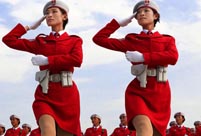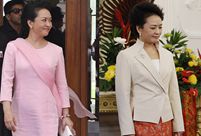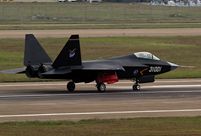 Close-up view of August Aerobatic Team
Close-up view of August Aerobatic Team
 Goddesses married in 2014
Goddesses married in 2014
 Polar region photos raise worldwide awareness of global warming
Polar region photos raise worldwide awareness of global warming
 Get off at the last stop — Beijing Subway in vision
Get off at the last stop — Beijing Subway in vision
 Top 100 beauties in the world!
Top 100 beauties in the world!
 Gallery: Who is the most beautiful one?
Gallery: Who is the most beautiful one?
 If you like autumn, put your hands in the air!
If you like autumn, put your hands in the air!
 Fan Bingbing's "Queen style" in new play
Fan Bingbing's "Queen style" in new play
 Lingerie show at 2014 Miss China
Lingerie show at 2014 Miss China
 J-10 fighters show aerobatic stunts in smog-free sky
J-10 fighters show aerobatic stunts in smog-free sky
Overview
Though a small economy, Macao pursues an open economic policy. It boasts one of the lowest tax regimes in the Asia Pacific region and sound financial stability. As a free port and a separate tariff zone, which has no foreign exchange controls, Macao is an active player in the regional economy and a vital link between the mainland Chinese and global markets.
The Macao Special Administrative Region (MSAR) has maintained rapid growth since its establishment, with its economy growing by an average of 11.9 percent in real terms in 2013. Macao’s gross domestic product (GDP) was 413.5 billion patacas. This translates into 697,502 patacas or US$87,306 of GDP per capita – one of the highest in Asia. There was an increase in GDP of 10.2 percent in real terms during the first half of 2014.
As of the end of 2013, Macao’s fiscal reserves were 168.9 billion patacas, an increase of 68.66 billion patacas over the same period in the previous year. Macao’s foreign reserves were 128.95 billion patacas as of the end of 2013.
According to statistics provided by the Monetary Authority of Macao, as of May 2014 Macao’s foreign reserves was 122.7 billion patacas or US$15.37 billion.
Macao’s small-scale economy is characterised by its openness and flexibility and enjoys a unique position in the regional economy. It used to be largely dependent on export trade, but the services sector is playing an increasingly bigger role as the processing industry tries to adapt itself to changing times.
Macao is one of two international free ports in China. Goods, capital, foreign exchange and people flow freely in and out of Macao. Since the establishment of the MSAR Government, economic policy in Macao has focused primarily on protecting and streamlining its free market economic system. It has cultivated a world-recognised, free and open, fair and orderly market environment.
In May 2013, the World Trade Organization (WTO) released a trade policy review of Macao, a study that takes place every six years. The report reaffirmed the openness of Macao’s economy, with its zero-tariff policy and minimum trade and investment restrictions. It also recognised Macao’s achievements in its service-based economy over the past six years. Meanwhile the report affirmed Macao’s improvements in trade policies and business environment, including enhancement of the intellectual property rights system, further opening of the services industry (the telecom sector in particular), facilitation of trade (such as paperless customs clearance and increased transparency in public administration). This is the Macao SAR’s third WTO trade policy review since the previous one in 2007.
According to the 2014 Index of Economic Freedom released by the US-based Heritage Foundation, Macao was ranked seventh in the Asia Pacific region and ranked number 29 among 177 economies globally, and is considered a “mostly free” economy.
Capitalising on its unique advantages, the MSAR strives to strengthen economic cooperation and develop into an international trade services platform for the region. It aims to give full play to its longstanding ties with the Asia Pacific region, the European Union, Romance language-speaking countries and especially Portuguese-speaking countries, thereby cementing its role as the bridge between mainland China and these economies.
 |
 20 years on: Relocated Three Gorges residents through lens
20 years on: Relocated Three Gorges residents through lens PLA HK Garrison veterans leave behind beautiful smiles
PLA HK Garrison veterans leave behind beautiful smiles Representative beauties of each province in China
Representative beauties of each province in China Chestnut girl goes viral online
Chestnut girl goes viral online Victoria's Secret Fashion Show
Victoria's Secret Fashion Show In photos: Bright and brave female soldier of PLA
In photos: Bright and brave female soldier of PLA China's charming first lady
China's charming first lady Excellent photos of Zhuhai Air Show
Excellent photos of Zhuhai Air Show China's heavyweight aircraft
China's heavyweight aircraft An old problem
An old problem Despite torture report, US escapes censure
Despite torture report, US escapes censure  Inflation hits five-year low
Inflation hits five-year low Runaway brides
Runaway bridesDay|Week|Month